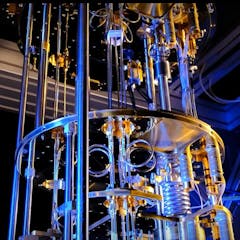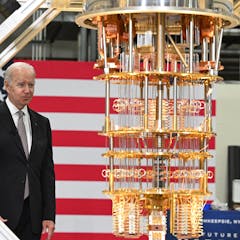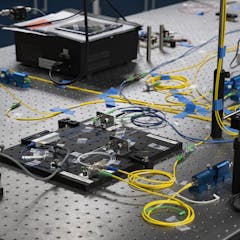
Articles on Quantum computing
Displaying 1 - 20 of 97 articles

A huge investment in building an unproven quantum computer may help local science and industry, but the results are far from a sure thing.

A flawed paper shakes confidence in the foundations of ‘quantum-proof’ encryption – and highlights the need for a new generation of experts.

Quantum computers that work at slightly higher temperatures could be cheaper and more accessible.

Quantum computing has huge promise from a technical perspective, but the practical benefits are less clear.

End-to-end encryption provides strong protection for keeping your communications private, but not every messaging app uses it, and even some of the ones that do don’t have it turned on by default.

Quantum computers are proving extremely difficult to build, and there is no guarantee they will live up to their designers’ hopes.

Several companies have made quantum computers, but these early models have yet to demonstrate quantum advantage: the ability to outstrip ordinary supercomputers.

After decades of hype, quantum computers are on the verge of becoming useful. Here’s a refresher on why they’re such a big deal

Scientists show they can create quantum superpositions of sound particles, pointing to the potential for mechanical quantum computers.

Quantum machine learning models could help us create AI systems that are almost impenetrable by hackers. But in the hands of hackers, the same technology could wreak havoc.

Countries around the world are racing to develop quantum technologies for computing, sensing and communication. Australia is trying not to get left behind.

Superconductors make highly efficient electronics, but the ultralow temperatures and ultrahigh pressures make them costly and difficult to use. Room-temperature superconductors promise to change that.

In the age of AI, people might wonder if there’s anything computers can’t do. The answer is yes. In fact, there are numerous problems that are beyond the reach of even the most powerful computers.

To protect against future quantum cyber attacks, two technological paths are being explored. Decryption.

When it comes to physics experiments, quantum simulations aren’t quite the real thing – but in some cases they’re much closer than you’d expect.

Canada is well positioned to gain far-reaching economic and social benefits from the rapidly developing quantum industry, but it must act now to secure its success.

Recent suggests quantum computers could solve problems with breathtaking speed by comparison to current supermodels.

Quantum entanglement is the stuff of sci-fi, advanced physics research and, increasingly, technology used by governments, banks and the military.

Various innovations after the past century have improved the world for many - but there’s still much more for universities to do.

China and the US are racing for quantum technology breakthroughs in weapons, communications, sensing, and computing that could tilt the balance between the world’s military forces.
